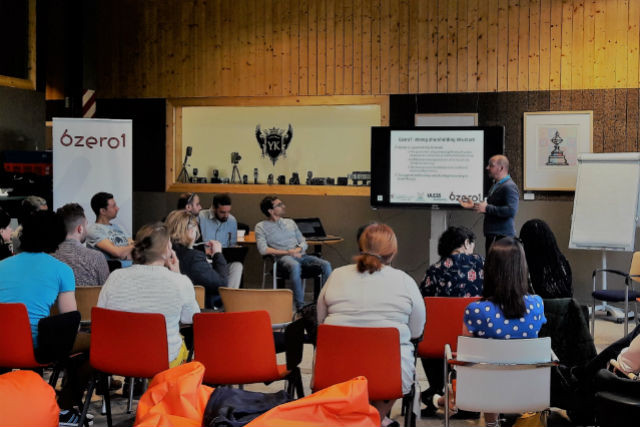Jess Bauldry: What prompted you to set up Sleeves Up Meet Ups?
Fabienne Colling: The Sleeves Up Meet Ups is a series of lunch discussions for the participants of our workshops, where they can meet and exchange with real entrepreneurs and with the partner institutions of our network. They are meant to inspire, motivate and inform as the testimonials mostly come from refugees who took the leap to set up their own company in Luxembourg.
JB: Given that the Meet Ups are just one aspect in your approach to support refugees in entrepreneurship, what are the other activities you organise in this context?
FC: Twice a year we propose a set of 6 workshops in English about how to create a company in Luxembourg to asylum seekers and beneficiaries of international protection. The objective is to help them understand the system and identify the resources (institutions, trainings, coaching, financing, etc.) that they can use to develop their business idea. We also conduct about 10-15 information sessions a year about entrepreneurship in Luxembourg, together with partner associations that work with refugees or immigrants in general. Of course, we also meet with people on an individual base to give general information and put them in touch with relevant institutions.
JB: What have been the outcomes so far from connections created via Sleeves Up? Have concrete projects been created, for instance?
FC: Since the start of the programme in September 2016, we welcomed more than 350 people at our information sessions, met with 160 project owners, accompanied around 10 projects of refugees that are active and trained 25 people in our workshops. But most people who come to see us do not fulfill all the requirements or have the means yet to launch their project. In this case, i.e., we help them prepare to integrate the Fit4Entrepreneurship programme of Adem or to participate in the business management class of the House of Training that will provide them with a certificate that facilitates access to certain business permits. We stay at their side to work on the business plan, understand communication with administrations and broaden their network.
JB: Besides finance, what are the main obstacles for refugees in starting up businesses in Luxembourg, compared to non-refugee entrepreneurs?
FC: It is difficult for refugees to get their experience and skills recognised in Luxembourg. While getting a business permit for trade or restaurant activities is achievable in most cases, it is almost impossible to establish crafts activities as a refugee in Luxembourg. Most craft activities in Luxembourg require an extensive education (apprenticeship plus master) at worst, or a proven track record in the field at best. Both are difficult to provide as most countries in the world don’t attest craft activities by diplomas or people practised multiple activities at a time.
JB: What kinds of businesses do the refugees you are collaborating with want to establish in Luxembourg?
FC: As a matter of fact, most refugees we meet would like to open restaurants, which is understandable as in terms of business permit and client acquisition, it seems to be the more realistic way to go. But often people underestimate the initial investment and the running costs of a restaurant project and must abandon the idea after some calculations. An approach that shows potential, is to combine a working contract (even short-term or part-time) with an independent activity. As refugees often work for the minimum salary, adding an independent income can substantially improve their financial situation without exposing them to the risks of launching a new company. But of course, every candidate has his or her own story and situation, which is why we always work on a case by case base.
JB: How can people in Luxembourg assist?
FC: First, spread the word. We are here to answer questions and provide information, even if launching a business is just one of many options or if you are still waiting for your refugee status to be recognised. Launching a business needs preparation, so if you have an idea, better start planning, preparing and calculating right away. We are also looking for volunteers who’d like to coach a refugee with a project during the preparation phase. You don’t need to be an entrepreneur yourself, because many people present relevant skills that can help project owners to better understand the implications of their project (accounting, legal, marketing, etc.) while also broadening their network.
